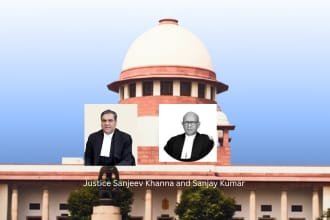In a major rebuke to senior Delhi Police officers, the Principal Bench of the Central Administrative Tribunal (CAT) recently quashed the dismissal orders against two police officials, holding that their removal from service was based purely on suspicion, assumptions, and without any concrete evidence or due process.
The Tribunal, presided over by Judicial Member RN Singh and Administrative Member Rajinder Kashyap, found that the action taken by the Disciplinary Authority was in clear violation of settled legal principles and reflected a serious misuse of power under Article 311(2)(b) of the Constitution of India.
Background: Dismissal Without Regular Inquiry
The two police personnel, Constable Akash and Head Constable Mangtu, were dismissed from service following allegations of their involvement in a robbery case registered in July 2023. The Delhi Police alleged that they robbed ₹28.5 lakh from the complainant and invoked Article 311(2)(b) to terminate their services without conducting a formal departmental inquiry.
The justification offered was that witnesses in the case might not testify against the accused due to their influence as police officers.
However, the CAT ruled that such an action, based on mere presumptions without substantial evidence or a departmental inquiry, was unlawful.
Key Observations of the Tribunal
1. Dismissal Based on Assumptions and Suspicion
The CAT observed that the dismissal orders were based entirely on assumptions that the allegations made in the FIR stood proved. The Tribunal categorically stated:
“Once the order of Disciplinary Authority is based on assumption as if the allegations made against the applicant already stand proved, that too on the content of FIR, the same act is enough to vitiate the order.”
Thus, the Tribunal emphasized that disciplinary actions cannot be sustained merely on the basis of FIR contents without independent evidence or inquiry.
2. Misuse of Article 311(2)(b)
The Delhi Police had invoked Article 311(2)(b), which allows dismissal without an inquiry if it is not practicable to hold one. However, the Tribunal noted that:
- There was no genuine assessment of whether a fair inquiry could be held.
- The authorities mechanically assumed that as police officers, the applicants could influence witnesses.
- No preliminary inquiry findings substantiated this fear.
The Tribunal said:
“It is absolutely wrong to record that a Head Constable/Constable is in any position to influence or threaten any witness.”
Thus, the invocation of Article 311(2)(b) was found to be completely unjustified.
3. Failure to Uphold Rule of Law
The Tribunal strongly criticized the “disdain approach” of the authorities toward the Rule of Law. It remarked:
“This could be construed as strong bias of respondents towards the applicant and their disdain approach to uphold Rule of Law.”
Both the Disciplinary Authority and the Appellate Authority were found guilty of acting mechanically without any independent application of mind.
4. Relief Granted to the Dismissed Officials
The CAT set aside the dismissal orders and ruled that Akash and Mangtu would be entitled to all consequential benefits, including:
- Reinstatement.
- Back wages (subject to rules).
- Restoration of seniority and service benefits.
The Tribunal also permitted Delhi Police to initiate fresh disciplinary proceedings, provided they adhere strictly to the procedural requirements under law.
Penalties Imposed on Senior Police Officers
In a rare and stern move, the Tribunal imposed personal costs of ₹50,000 each on:
- The Joint Commissioner of Police (Eastern Range).
- The Deputy Commissioner of Police (East District).
These costs are to be deposited in the Prime Minister’s Relief Fund within eight weeks.
Moreover, the Commissioner of Police was directed to:
- Record the “inaction” of the concerned officers in their Annual Performance Assessment Reports (APAR) for the year 2025-26.
This strong action aims to hold senior officials accountable for misusing disciplinary powers and failing to follow due process.
Importance of the Ruling
This ruling sends a strong signal on several fronts:
- Protection of Government Employees’ Rights: Even police constables and head constables have legal protections against arbitrary dismissal.
- Strict Interpretation of Article 311(2)(b): The clause is meant for exceptional situations where inquiry is genuinely impracticable, not as a tool to circumvent natural justice.
- Accountability of Senior Officials: Imposing costs and recording adverse entries in APARs reflects the judiciary’s insistence on real consequences for misuse of authority.
The Tribunal also reiterated that serious course correction is urgently needed within the Delhi Police, particularly in handling disciplinary matters.
Advocates Representing the Parties
- Advocate Ajesh Luthra appeared for the petitioners (dismissed police officials).
- Advocate Priyanka Swami represented the Delhi Police.
Conclusion
The CAT’s April 16, 2025, decision highlights the critical importance of upholding due process, respecting constitutional protections, and maintaining the integrity of administrative actions. It firmly establishes that disciplinary actions based on mere suspicions and FIR allegations, without independent inquiry and evidence, cannot stand judicial scrutiny.
As government departments and police forces deal with sensitive misconduct allegations, this judgment underscores the need for fairness, transparency, and strict adherence to the Rule of Law.
Moving forward, this ruling should serve as a reminder that disciplinary authority is a serious responsibility, not a tool to be wielded arbitrarily or punitively.


